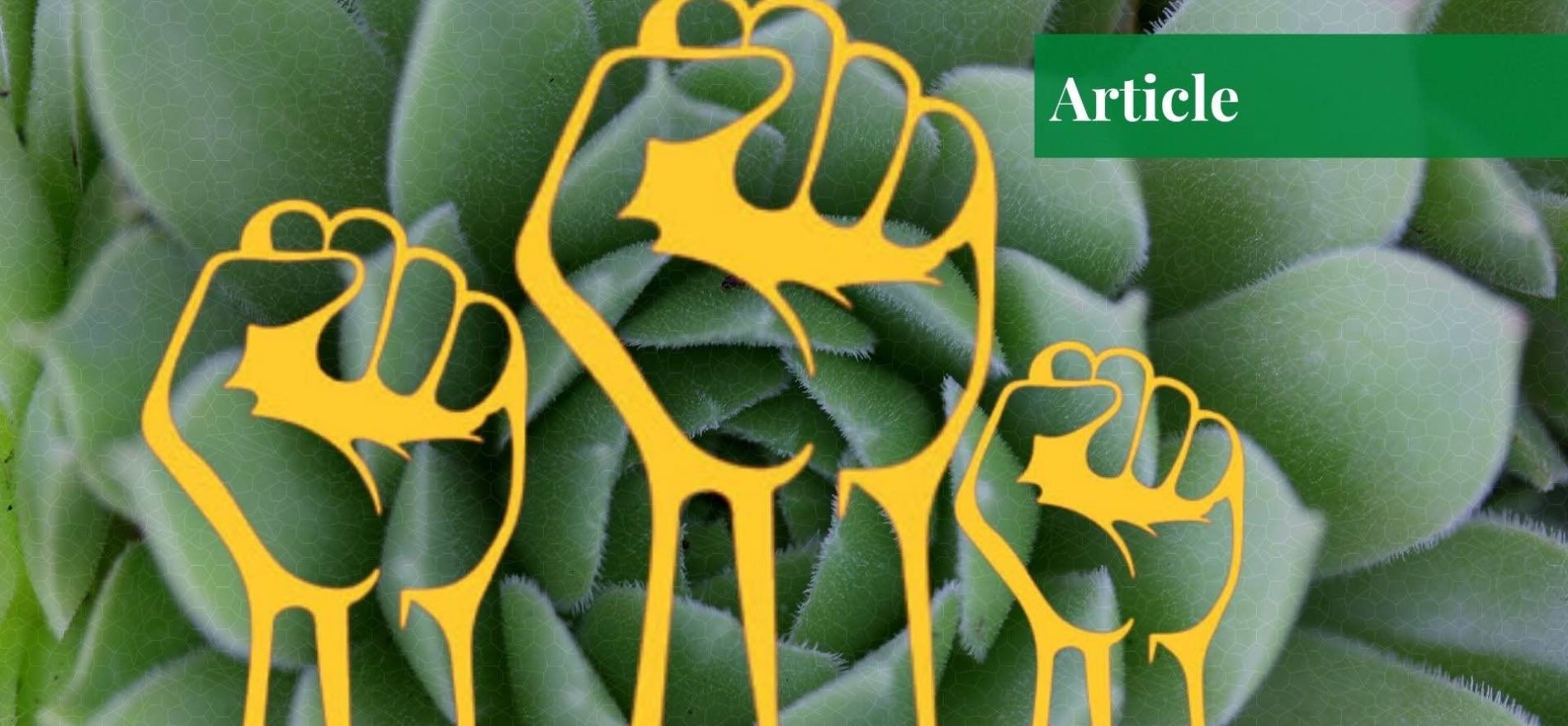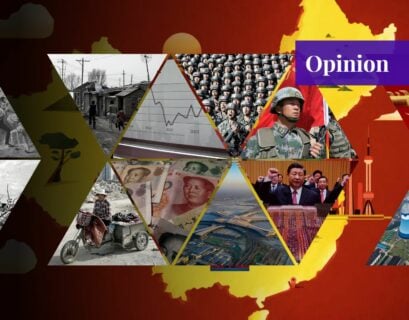Introduction
“All progress in capitalistic agriculture is a progress in the art of robbing not only the labor but the robbing of the soil as well.” (Karl Marx, Capital, Volume 1).
Over the past few decades, the environment has been at the foremost of media, with phrases such as “climate change” and “ecological crisis” painting the headlines. Such news bombardment is backed with considerable shreds of evidence and yet the human race couldn’t be more ignorant.
In the face of a fossil fuel-driven economy and heavily industrialized mode of production, unlimited accumulation of capital, increased commodification of everything, and ruthless exploitation of not only nature but also labor, all to meet the rapid competition for maximization of profit. As such, “capitalism is arguably the most fundamental challenge facing humanity today.”
The contemporary capitalist civilization is in a deep crisis, witnessing the steady destruction of our planet as the capitalist class sucks the Earth’s resources dry. According to a study conducted in 2002 by the United States National Academy of Sciences, Earth surpassed its resource re-generation capacity long ago i.e., in 1980.
According to another study by WWF, Earth will expire by 2050. Yet the current mode of production based on the capitalist infinite growth model is sustained even though Earth’s resources are finite, leading to an unsustained environment. This imbalance in resource extraction and resource regeneration obstructs the natural growth cycle.
In the face of such rapid degeneration at social and ecological costs alike, there is a dire need for a radical and systematic change. There is a need for a great transition and ecological socialism which with its red-green perspective can help, providing a thought for a change.
Also referred to as ecological Marxism, eco-socialism is marked as the left strand of green politics with its core thesis on the capitalist system which brings forth the exploitation not only of labor through its focus on “productivity” but also of the very means of productivism i.e. the resources, leading them to an edge, to a point of replenishment. It is what critics call “the robbery of nature.”
Thus, to fight the ecological crisis, it is necessary to cater to the anti-capitalist thought by paving way for eco-socialism, which, in essence, provides a leftist-green i.e. a red-green perspective on the modern environmental crisis.
The Case Against Capitalism
The catchphrase “system change not climate change” is one very thought-provoking slogan, chanted at social-ecological movements around the globe to indoctrinate the very idea that to avoid ecological catastrophe, the society must transition away from the economic system of capitalism. It is the bedrock of ecological socialism and the main argument of red-green environmentalists to make their case against capitalism, They argue that capitalism is the core factor of birth of all kinds of social and environmental crises alike and its monopolies are slowly killing our planet.
The primary driving force of capitalism is the production for profit followed by re-investment of this profit and then the ultimate expansion of capital stock to repeat the cycle. This steady production is always based upon the steadily accelerating destruction of environmental resources. Therefore, to state that the ecological problems are inherent to the economic activity is quite correct. This makes it evidently clear that ecological catastrophes are mainly a product of hyper-productivism, putting the whole existence of life as we know it in threatening jeopardy.
Pollution, climate change, global warming, and deforestation are only a few aspects of this ecological cataclysm, all of which pave way for a greater catastrophe in the face of exhaustion of natural resources in the wake of hyper industrialized capitalism. In order to produce more and gain more economic prosperity, this hyper industrialized capitalism leads to the exploitative and unsustainable use of the environment.
This new normal has led to rapid technological and demographic changes thus, putting a strain on the environment. This creates an alienation of man from nature, as Marx put it. Therefore, it is no wonder why the modern-day environmentalists and socialists are so critical of capitalism, as a system under which exploitation is inherent, be it of humans or the environment.
Green Socialism: An Evolutionary Development
The effort of linking Marxism or socialism with ecologism may seem as if trying to bridge two entirely distinct discourses, one with ideas revolving around social classes and the other with ideas of human-nature interactions, when in fact both juxtapose each other. Socialism has influenced ecological thought and practice whereas, ecology has transformed socialist thought and practices. Thus, both are complexly interdependent and dialectical.
Upon combing together, the socialist-Marxist perspective with ecologism emerges the eco-socialism or the eco-Marxist perspective. This perspective combines the “leftist ideology” with “green politics” by placing the capitalist model as the sole bearer of social and environmental crises. It fuses the Marxist doctrine of anti-capitalism with ecology and environmental politics with its tenants hypothesizing that the root cause of the environmental crisis, war, poverty, and inequality is the system of capitalism under the supervision of states and transnational structures.
Often referred to as the “Red-Greens” and “fundies,” eco-socialists identify themselves interchangeably with Marxist ecologists, thus deriving the train of ideas for their theory from the broader theory of Marxism. The combination of politics of the environment with the politics of the socio-economic domain has culminated in the name Red-Greens.
It is generally believed among eco-socialists that Karl Marx, by providing his discourse on the “metabolic rift,” can be regarded as the originator of the ecological worldview. Marx viewed this metabolic rift between nature and man as a consequence of the capitalist system given that it leads to capitalist private ownership of the globe and its resources by one man or group.
He further noted that society must hand down the environment to succeeding generations in an improved condition, reflecting the approach to sustainability in his writings. Many criticize Marx for treating nature and the environment as just another commodity to be handed down from capitalists to laborers without actually valuing it for itself. Nonetheless, Marx was one scholar to actually recognize the issue where it lies i.e., in capitalism and its exploitation of the environment in the name of over-production and globalization.
It is from the basis set by Marx in his case against capitalism and his theory of alienation that eco-socialism has emerged as a dynamic environmental theory within the mainstream green political discourse. Paul Berkett and John Bellamy Foster are the two major names in the modern eco-socialist discourse contributing through academic literature to enhance the very tenants of ecological Marxism and ecological socialism.
However, the theoretical traces of eco-socialist thought go back to the 1880s when William Morris promoted and credited key principles of eco-socialist ideology. He combined social democratic ideas with socialist ecological ideas which were later taken forward in the wake of major environmental and green movements worldwide. It was a time when environmental conservation and environmental politics were at the forefront of the global agenda, leading to the development of various theories.
Among them, eco-socialism, with its roots going back to Marx’s theory, attracted a larger orientation of the “left-wing” environmental activists, all spurring environmentalism through postulates against capitalist ideology. Alan Roberts and Rudolf Bahro have contributed significantly to the propagation of this eco-socialist theoretical discourse.
In contrast to eco-capitalists and other forms of green politics which adhere to sustainable development through the continuation of capitalism by creating a market of “ecology,” eco-socialists seek anti-capitalist viewpoints. The term “watermelon” is often associated with them as they’re “green on the outside but red on the inside.”
The ecological socialist perspective holds itself as an emancipatory first epoch social voice on environmental degradation carried out by capitalists. Thus, it focuses on communal ownership irrespective of gender and race, which will decrease hyper-productivism and eventually lead to a more sustainable world growth at a global level. Provided below are the two main tenants of ecological socialism, the entire thesis of which is based to dismantle capitalism.
Critique of Capitalism
According to eco-socialists, the main mantra of the capitalist class is the attainment and maximization of profit at all costs which leads to the very foundation of the destructive system, with its two flaws: class polarization which causes conflict and inequalities and environmental unsustainability. As Karl Marx (1976) has put it, “labor is the father of material wealth, the earth is its mother.” According to the Marxist perspective, upon which the agenda of “red-green” socialist ecological thought is primarily based, humans and nature are the principal wheels of the creation of capital.
Therefore, it is no wonder the capitalist class tries to have them both under control, by subjugating the proletariat as well as by destroying the environment. This ideology maintains that it is through the replacement of capitalism with common ownership of means of production, that an ecological crisis can witness a break, given that humans and nature are two strands of the same knot. Hence, the destruction of the capitalist system will usher in emancipation for both man and nature.
Moreover, one common belief of capitalist ideology is that it treats nature as the “other” and as an entity or a commodity to be used guilt-free for the fulfillment of human needs. This is the principle upon which it gets criticized by eco-socialists and deep ecologists alike, given that it exploits and oppresses nature by treating it secondary to human needs.
The existing monopolies of the capitalist system treat nature with instrumental value while according to eco-socialism, the environment has in itself an intrinsic and an inherent value and should be preserved from profit-seeking endeavors. Capitalism, in short, has a parasitic relationship with the environment. It is a resource-sucking vampire causing a rampant degradation of the environment in the face of rapid industrialization, societal breakdown, destruction of habitat, and pollution of the environment, all for profit purposes. Thus, the fight against climate change is the fight against capitalism.
In the past several decades, there is a rise in counter-narratives of eco-socialism led by eco-capitalists, aiming for sustainable development and a sustainable economy. These narratives, in theory, are aimed at ecological preservation through capitalist tenants but, in practice, are the same old story of decreasing ecological destruction wrought by capitalist expansion by further expansion of capitalism.
It reflects market ecology and, as Bellamy Foster put it, this vision is just another renewed strategy for profiting over planetary destruction. Thus, the very idea of a capitalist mode of production is incompatible with environmental sustainability. Eco-socialism in turn, advocate for a “system change” through a succession of capitalism by a system more egalitarian in economic, political, and social aspects.
The system must be changed through a radical shift from an oppressive structure to one where human needs are met without any degradation of the environment, under which the relationship between man and nature will harmonize instead of deteriorating. Some scholars put it under the agenda of “de-growth” given that we have reached the time when even sustainable development is slow a process to essentially solve the environmental crisis.
The modern-day enormous economy demands constant and steadily increasing consumption of resources to be upheld. It needs things consumed, worn out, and burned, resources extracted, and wastes discarded at an ever-increasing rate. This mode of growth needs an immediate systematic change under eco-socialism as it is now the only way forward to save the planet from a major ecological crisis.
Alienation From Nature
In addition to a critique of capitalism, the eco-socialist perspective combines Marxist alienation with green thought and states that the capitalist alienation of humans is not only limited to the products of their labor but also applies to nature as well. Humans constitute the very essence of nature and being a part of nature, they are a part of what they produce given that production comes from resources of the environment.
Under a capitalist system, this alienation doesn’t only make humans estranged from material sources but also nature itself, leading to guilt-free exploitation of the environment. This human alienation from nature in turn has resulted in political resource extraction for development and profit growth.
Oil companies and other industries are the very breathing examples of what it means to be alienated under a capitalist system and as long as such a system holds up, the environmental and social exploitation will hold up. Eco-socialism cojoins these two entities as one breathing organ, given that capitalism makes use of the environment through the labor of humans while alienating and robbing the very laborers of their fruits.
In order for the survival of hyper-productivism, capitalists gnaw at the soil and workers alike. This makes the production, as well as the very consumption, alienated. Therefore, to reduce this isolation of man from the environment, a system change is necessary, which according to the advocates of ecological-socialism and eco-Marxism, can be achieved through zero economic growth.
Such ideological notions and red-green orientation led to a significant development of eco-socialist thought in the 1990s when environmentalism met with anti-globalist engagements and thus, the eco-socialist manifesto began charging the streets. Over the years, these red-green ideas have progressed but it has had little direct influence on environmental policies.
But since the past few years, there has been a shift as people have begun to realize how economic and ecological crises intertwine and eco-socialism has begun to gain adherents. Eco-socialist campaigns have been witnessed to gather a strong momentum as the world now faces the choice of “the end of capitalism or the end of planet earth?”
Conclusion
Rejecting capitalism upon the basis of its definition of progress, eco-socialism has witnessed a steady growth within environmental political discourse. Unlike the capitalist idea of market growth through quantitative expansion, eco-socialism advocates for a non-monetary criterion in the face of equilibrium between social and ecological well-being. It criticizes the capitalist tenant of productivism for it ignores the natural limitations of the environment.
The very core idea of eco-socialism is to radically alter the system. It’s a challenge to the unsustainable status quo. It’s a voice for a systematic reconstruction of the economy upon the basic principles of democratic and ecological planning, provided that this planning might even entail de-growth as a part of the eco-socialist agenda. In short, both the individual eco-systems and global biospheres are shaped by human production and consumption.
Given the limited numbers of natural resources, both will inevitably suffer as a result of unsustained human and social development which puts a constant strain on the environment. This strain is mainly a result of the underlying political-economic system of capitalism which let the crisis remain intact. Thus, to have a profound ecological transformation, a profound systematic transformation is needed, and a great transition initiative is needed. As Bellamy Foster has remarked and I quote:
“For those concerned with the fate of the earth, the time has come to face facts: not simply the dire reality of climate change but also the pressing need for social-system change.“
If you want to submit your articles, research papers, and book reviews, please check the Submissions page.
The views and opinions expressed in this article/paper are the author’s own and do not necessarily reflect the editorial position of Paradigm Shift.



















